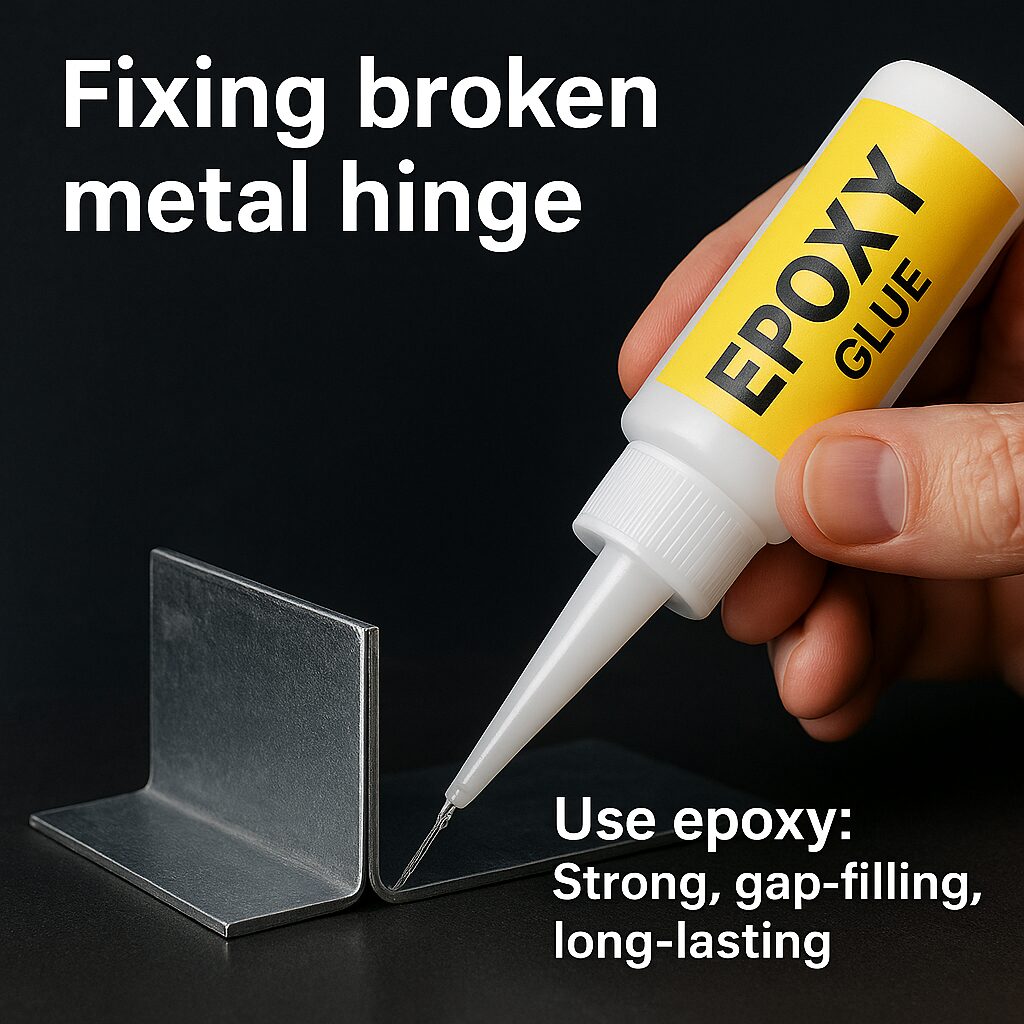When it comes to bonding metal surfaces, two adhesive types dominate the conversation — epoxy glue and cyanoacrylate glue (commonly known as super glue). Whether you’re repairing a broken appliance, assembling a metal fixture, or handling a DIY project, choosing the right adhesive can significantly impact the durability and strength of your bond.
In this post, we’ll break down the chemical differences, bonding strength, durability, application scenarios, and ultimately help you answer the question: Is epoxy glue stronger than cyanoacrylate for metal bonding? Let’s dive in.
Epoxy vs. Cyanoacrylate- Similarities and Differences
What is Epoxy Glue?
Epoxy adhesives are two-part systems made of a resin and a hardener. When mixed, they undergo a chemical reaction that forms a durable, high-strength plastic-like material. Epoxies are renowned for their exceptional bonding strength, especially for metal, wood, plastic, and even concrete surfaces.
Key properties of epoxy:
- Long curing time (minutes to hours)
- High mechanical strength
- Excellent gap-filling ability
- Superior heat and chemical resistance
What is Cyanoacrylate (Super Glue)?
Cyanoacrylate adhesives are fast-drying, single-component glues that bond almost instantly upon contact with moisture. They are widely used for quick fixes, especially for non-porous materials like metal, plastic, rubber, and glass.
Key properties of cyanoacrylate:
- Instant bonding (within seconds)
- Ideal for smooth, tight-fitting surfaces
- Lower temperature and chemical resistance
- More brittle compared to epoxy

Which Is Stronger for Metal Bonding?
1. Bonding Strength
Epoxy glue wins in terms of shear and tensile strength. When bonding metals like aluminum, steel, or copper, epoxy forms a chemical bond that can withstand heavy loads, vibrations, and environmental wear. Industrial-grade epoxies can withstand up to 4,000 PSI or more.
Cyanoacrylate, while quick and convenient, typically offers bond strengths around 1,000 to 3,000 PSI, and is more prone to cracking under stress or prolonged exposure to moisture or heat.
Verdict: Epoxy glue is stronger than cyanoacrylate for metal-to-metal bonding.
2. Durability and Resistance
Epoxy adhesives offer high resistance to moisture, heat, UV light, and chemicals, making them suitable for both indoor and outdoor metal applications. They are often used in automotive, aerospace, and heavy machinery repairs.
Cyanoacrylate glues, on the other hand, may degrade under prolonged exposure to water, heat above 180°F (82°C), and certain solvents. They are ideal for short-term fixes or low-stress conditions.
Verdict: Epoxy provides greater long-term durability in harsh conditions.
3. Gap-Filling and Surface Imperfections
Metal surfaces are rarely perfect, especially when dealing with worn-out parts or irregular shapes. Epoxy glue can fill small gaps and conform to uneven surfaces. Cyanoacrylate, by contrast, requires tight mating surfaces to form a strong bond and fails when used on porous or rough metal surfaces.
Verdict: Epoxy glue is better for non-perfect surfaces and complex joints.
When to Use Each Glue for Metal
Use Epoxy Glue When:
- You need maximum strength and durability
- The metal parts have gaps or uneven surfaces
- You’re working on load-bearing or outdoor applications
- Resistance to heat and chemicals is important
Use Cyanoacrylate Glue When:
- You need a quick fix or temporary bond
- You’re working with tight-fitting, smooth metal pieces
- The bond won’t be subject to extreme temperatures or heavy loads
- Speed and convenience are more important than longevity
Real-World Applications
| Application | Recommended Glue | Reason |
|---|---|---|
| Fixing broken metal hinge | Epoxy | Strong, gap-filling, long-lasting |
| Bonding small metal trinkets | Cyanoacrylate | Fast drying, easy to apply |
| Repairing automotive parts | Epoxy | Vibration and heat resistant |
| Crafting metal jewelry | Cyanoacrylate | Precise, no need for long curing |
| Outdoor metal fixtures | Epoxy | Weatherproof and rust-resistant |
Final Verdict
In most metal bonding scenarios, epoxy glue outperforms cyanoacrylate in strength, resistance, and durability. While cyanoacrylate is perfect for speed and ease of use, epoxy is your go-to solution when you want a permanent, high-performance bond that stands the test of time.
FAQs (Frequently Asked Questions)
Q1. Is epoxy glue stronger than cyanoacrylate for metal?
Yes, epoxy glue is stronger than cyanoacrylate for metal bonding. It offers higher tensile strength, durability, and better resistance to heat, moisture, and chemicals.
Q2. Which glue is better for heavy-duty metal repairs?
Epoxy is better for heavy-duty metal repairs due to its gap-filling ability, long-lasting strength, and high resistance to stress, vibration, and environmental factors.
Q3. Can super glue hold metal permanently?
Super glue (cyanoacrylate) can bond metal quickly, but it’s not ideal for permanent or structural use. It’s best for smooth, low-stress metal surfaces and quick fixes.
Q4. Does epoxy glue work on all metal types?
Yes, epoxy glue works on most metals like steel, aluminum, copper, and brass. It forms strong chemical bonds and adapts well to irregular surfaces.
Q5. How long does epoxy last on metal?
When applied properly, epoxy glue can last for years on metal. It resists corrosion, heat, and moisture, making it ideal for both indoor and outdoor use.
